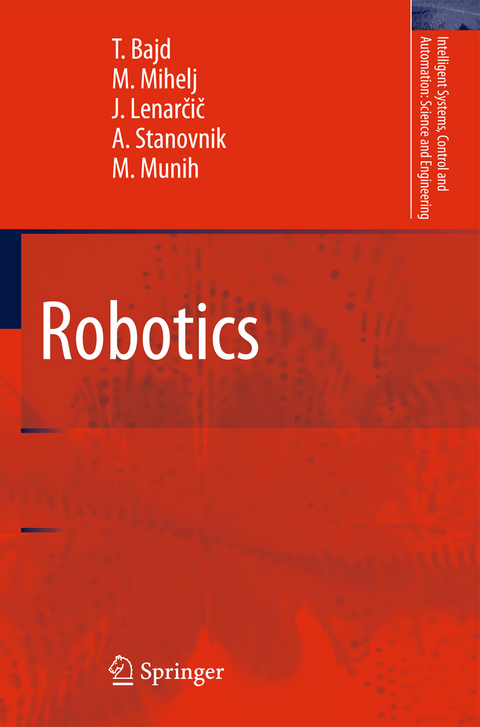
Robotics
Seiten
2012
Springer (Verlag)
978-94-007-3157-8 (ISBN)
Springer (Verlag)
978-94-007-3157-8 (ISBN)
This supplementary introductory text for courses in robotics or industrial robotics requires minimal knowledge of physics and mathematics. It treats many fundamental subjects in robotics and includes a glossary in English, French and German.
The word "robot" does not originate from a science or engineering vocabulary. It was rst used in the Czech drama R.U.R. (Rossum's Universal Robots) written by Karel Capek and was rst played in Prague in 1921 (the word itself was invented by his brother Josef). In the drama the "robot" is an arti cial human being which is a brilliant worker, deprived of all unnecessary qualities: feelings, creativity and capacity for feeling pain. In the prologue of the drama the following "de nition" of robots is given: Robots are not people (Roboti nejsou lide). They are mecha- cally more perfect than we are, they have an astounding intellectual capacity, but they have no soul. The creation of an engineer is technically more re ned than the product of nature. The textbook "Robotics" evolved through more than 10 years of teaching robotics at the Faculty of Electrical Engineering, of the University of Ljubljana, Slovenia. The way of presenting the rather demanding subject was successfully tested with several generations of undergraduatestudents.
The word "robot" does not originate from a science or engineering vocabulary. It was rst used in the Czech drama R.U.R. (Rossum's Universal Robots) written by Karel Capek and was rst played in Prague in 1921 (the word itself was invented by his brother Josef). In the drama the "robot" is an arti cial human being which is a brilliant worker, deprived of all unnecessary qualities: feelings, creativity and capacity for feeling pain. In the prologue of the drama the following "de nition" of robots is given: Robots are not people (Roboti nejsou lide). They are mecha- cally more perfect than we are, they have an astounding intellectual capacity, but they have no soul. The creation of an engineer is technically more re ned than the product of nature. The textbook "Robotics" evolved through more than 10 years of teaching robotics at the Faculty of Electrical Engineering, of the University of Ljubljana, Slovenia. The way of presenting the rather demanding subject was successfully tested with several generations of undergraduatestudents.
Homogenous transformation matrices.- Geometric description of the robot mechanism.- Two-segment robot manipulator.- Robot sensors.- Trajectory planning.- Robot control.- Robot environment.- Standards and safety in robotics.
| Reihe/Serie | Intelligent Systems, Control and Automation: Science and Engineering ; 43 |
|---|---|
| Zusatzinfo | VIII, 152 p. |
| Verlagsort | Dordrecht |
| Sprache | englisch |
| Original-Titel | Robotski Mehanizmi |
| Maße | 155 x 235 mm |
| Themenwelt | Informatik ► Theorie / Studium ► Künstliche Intelligenz / Robotik |
| Naturwissenschaften ► Physik / Astronomie ► Mechanik | |
| Technik ► Elektrotechnik / Energietechnik | |
| Technik ► Maschinenbau | |
| Schlagworte | computer vision • control engineering • Dynamics • encoders • Grippers • industrial robots • Kinematics • mechanisms • Roboter • Robotics • robotic vocabulary • robot modelling • sensors • standards and safety • Textbook |
| ISBN-10 | 94-007-3157-4 / 9400731574 |
| ISBN-13 | 978-94-007-3157-8 / 9789400731578 |
| Zustand | Neuware |
| Haben Sie eine Frage zum Produkt? |
Mehr entdecken
aus dem Bereich
aus dem Bereich
Eine kurze Geschichte der Informationsnetzwerke von der Steinzeit bis …
Buch | Hardcover (2024)
Penguin (Verlag)
28,00 €
was sie kann & was uns erwartet
Buch | Softcover (2023)
C.H.Beck (Verlag)
18,00 €


